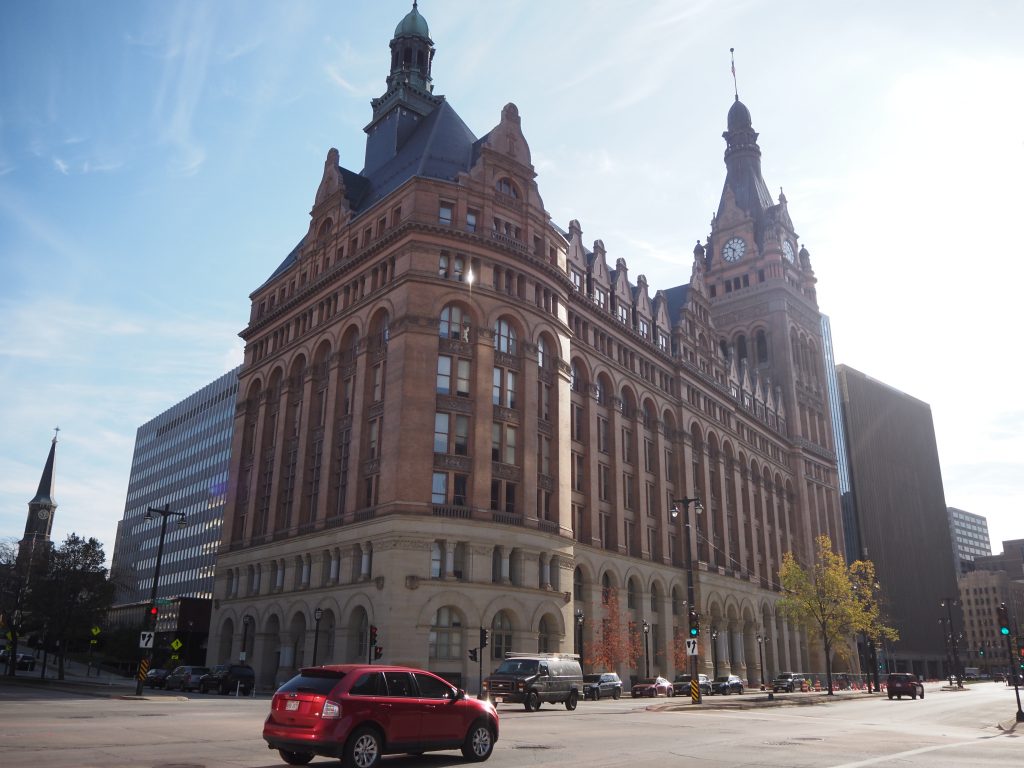Mayor Unveils 2024 Budget With New Sales Tax
But a massive deficit still looms for Milwaukee.
Thanks to a new sales tax, increased shared revenue and a federal grant, the City of Milwaukee doesn’t find itself in a fiscal bind for 2024. But challenges still loom on the horizon.
For 2023, no departmental cuts are planned; the number of firefighters and police officers will increase and the number of streets being repaved will increase. “We are un-deferring maintenance,” said budget director Nik Kovac.
Mayor Cavalier Johnson and Kovac previewed the $1.91 billion budget Monday in advance of the mayor’s Tuesday budget address to the Common Council. The council will spend the next month listening to community feedback, hearing departmental plans and drafting amendments before voting on a final package.
The mayor said he’s “particularly proud” of a handful of items in the budget, including an effort to improve public safety, a proposal to double the number of vacant homes being demolished and an increase in the miles of streets being repaved and reconstructed.
The sworn strength of the Milwaukee Police Department will increase by 15 members, from 1,630 to 1,645, as part of a plan to run three 65-member recruiting classes. The Milwaukee Fire Department will see a previously mothballed fire engine restored to service and a new paramedic unit added, increasing daily staffing levels from 192 to 198. Johnson said the measures satisfy the requirements of Act 12, which granted the city the sales tax, but also are prudent public safety measures. The increased staffing is estimated to cost $5.6 million in 2024.
“We will be razing and reviving neighborhoods,” said Johnson of a $2.44 million doubling of the city’s demolition capacity. “If you look at some of the challenged neighborhoods that I grew up in, you have long-term homeowners who have stayed in those neighborhoods for some time and they’re living next to a property that is dilapidated, blighted, it needs to come down. It takes away from your property values. It’s a magnet for criminal activity, for people that do bad things in your neighborhood. We want to dig into our backlog.”
The proposal would boost the number of homes the city could demolish in a year from 90 to 180, by hiring a new in-house team to complement outside contractors. There were 350 homes, a mix of public and privately owned properties, on the “raze list” as of Dec. 31.
“The other thing that I’ve been working really hard on, and that this office has been focused on, is streets,” said Johnson. “We are making a larger investment in streets than the City of Milwaukee has before and I’m really proud of that.” The strategy goes beyond simply replacing asphalt to eliminate potholes, but extends to adding features like bioswales to manage stormwater runoff and build new protected bike lanes. “It’s my goal to have a protected bike lane network through the city of Milwaukee that will create more equity throughout neighborhoods,” said Johnson, who announced a commitment in June to build or have under development 50 miles of protected lanes by 2026.
Johnson is proposing to increase the high-impact paving program and local street construction program by $1 million each, boosting their combined 2024 budget to $16 million. High-impact projects involve quickly repaving the top layer of an asphalt road with a new layer that is intended to last approximately a decade. Local street reconstruction, a more costly and slower endeavor, involves rebuilding entire side streets. The city rebuilds major streets with state and federal support. The additional funding should cover 1.33 miles of high-impact paving and a half mile of local street reconstruction.
Instead of funding the demolition and road-building expenses with new borrowing, they’re some of the items Johnson is proposing to pay cash for as part of a one-time strategy. The city will use $36 million to address a capital project backlog while still borrowing $95 million, $1 million less than last year. Kovac said it would reduce future interest costs and eliminate the gap between desired capital projects, estimated at $200 million, versus what the city can actually afford.
“The projects the mayor’s chosen to cash finance are not discretionary projects,” said Kovac. “We are kind of just getting ahead to stabilize future budgets.”
One of the things the mayor doesn’t propose to touch in 2024 is the city’s reserve funds. For years, the city has been drawing down its various rainy day funds and the tens of millions of dollars they hold. “They’re getting smaller and smaller, which is not a good long-term trend,” said Kovac, pointing at a downward-sloping graph. “Now that we have a chance to have an ongoing balanced budget going forward, one of the things we’re not going to do is make withdrawals from those.”
The property tax levy would increase 2% to $317.4 million under the proposed budget to account for new construction and other state allowances. Fees would increase approximately 2%.
Future Challenges Loom
The new 2% sales tax and shared revenue increase aren’t a panacea for the city’s fiscal cliff. In fact, starting in 2025, a structural deficit of “tens of millions” is expected to return.
Calculating exactly how big that future deficit could be is complicated.
For one thing, there’s an issue of how much the sales tax will generate. Earlier this month, Comptroller Aycha Sawa estimated it would yield $184 million in 2024, down from the Wisconsin Department of Revenue‘s initial estimate of $193.6 million. The city must use the independently-elected Comptroller’s figure for budgeting purposes.
Then, there are the requirements embedded within Act 12, the state’s shared revenue and sales tax law. Because the pension system is closing to new entrants, the actuarial estimates that determine the required contribution have increased dramatically. The city now expects to contribute $175 million annually until the system is fully funded. In addition, Act 12 eliminated the five-year smoothing formula, which could result in dramatic one-year spikes or declines in pension payments based on financial market performance.
Through a series of complicated formulas, Act 12 also requires the city to consistently increase its police and fire staffing to reach certain targeted levels. Kovac described the various requirements as a “belt and suspenders” approach, a subtle nod to its complexity. The Wisconsin State Legislature’s requirements also come with some perverse consequences. Kovac said the city cannot count officers funded by grants towards its sworn strength total. As a result, Johnson said the city will not be seeking a federal COPS grant that has been often used to hire dozens more officers. Johnson said it’s a component of the law the city would seek to change in future state legislation. “We applied for COPS grants in the past because, prior to Act 12 at least, it made sense for us to allow the federal government to cover the costs for three years or whatever it was, but now there is a disincentive to do that,” said Johnson. “I don’t want to leave money on the table at the federal government because of what’s happening with Act 12.”
The labor market is also forcing the city to increase salaries and hourly wages for jobs continually. Kovac noted that the city faced record vacancies earlier in the year. The final cost of the wage increases is not known in part because its proved to be a moving target.
Most notably, the city must allocate all of the remaining $93 million from its $394.2 million American Rescue Plan Act grant by the end of 2024 or lose it. The city has been using the pandemic-era grant to delay its fiscal cliff and will do so again in 2024, but then will need to replace that funding. The $36 million cash financing strategy, which indirectly uses the grant money, is an attempt to maximize the long-term benefits of the grant by reducing future borrowing costs.
There is also a one-time surprise in the budget. The city must make a $25.5 million “catch up” pension payment. Kovac, a longtime member of the city’s pension board, said the issue can be attributed to the timing of when the city makes its payment based on estimated data versus the actual required contribution, calculated later in the year, and the elimination of the five-year smoothing formula. That one-time payment will be almost entirely offset by the approximately $22 million annual increase the city will receive in its state-shared revenue payment.
And there is another problem looming for the city in the halls of the Wisconsin State Capitol. The Republican-controlled Legislature’s planned American Family Field funding plan relies on the city giving back $2.5 million annually of its new sales tax. Johnson said the city is seeking modifications to Act 12 that could alleviate the issue. Detailed in a separate article, Johnson expressed his concerns with various facets of that bill, without outright opposing it.
Despite all the moving pieces and new issues, the city is in better financial shape than it was without the sales tax and increased shared revenue. A pre-sales tax city budget office report says that, without the new funding, the city would have needed to eliminate 700 of the approximately 1,600 police officers, 250 of the approximately 700 firefighters and 400 general city employees.
Look for substantial additional budget cover in the coming weeks. Want to know how it played out last year? See our coverage of the 2023 budget adoption cycle.
If you think stories like this are important, become a member of Urban Milwaukee and help support real, independent journalism. Plus you get some cool added benefits.
More about the 2024 Milwaukee Budget
- Council Overrides Mayor’s Veto, Adopts 2024 Milwaukee Budget - Jeramey Jannene - Nov 21st, 2023
- Mayor’s Veto Reduces Property Tax - Jeramey Jannene - Nov 14th, 2023
- Fight At City Hall Over Control of Board of Zoning Appeals - Jeramey Jannene - Nov 8th, 2023
- Full Legalization of Scooters Ends Up In City Budget - Jeramey Jannene - Nov 3rd, 2023
- 2024 Milwaukee Budget Increases Services, Taxes - Jeramey Jannene - Nov 3rd, 2023
- Council Debates 53 Budget Amendments, Adds Spending, Services - Jeramey Jannene - Oct 26th, 2023
- Tentative Deal Would Salvage Milwaukee’s Deconstruction Program - Jeramey Jannene - Oct 25th, 2023
- City Hall: Budget Amendment Would Boost Libraries, Streets, Voting and Lead Abatement - Jeramey Jannene - Oct 20th, 2023
- City Hall: Council Wants New Deal, Says Convention Center ‘Outsmarted’ City - Jeramey Jannene - Oct 16th, 2023
- Fire Department Reopening Station At 13th and Layton - Jeramey Jannene - Oct 15th, 2023
Read more about 2024 Milwaukee Budget here
Political Contributions Tracker
Displaying political contributions between people mentioned in this story. Learn more.
- July 29, 2020 - Cavalier Johnson received $100 from Aycha Sawa
- May 7, 2015 - Nik Kovac received $10 from Cavalier Johnson
City Hall
-
Council Blocked In Fight To Oversee Top City Officials
 Dec 16th, 2025 by Jeramey Jannene
Dec 16th, 2025 by Jeramey Jannene
-
Latest Effort to Adopt New Milwaukee Flag Going Nowhere
 Dec 3rd, 2025 by Jeramey Jannene
Dec 3rd, 2025 by Jeramey Jannene
-
After Deadly May Fire, Milwaukee Adds New Safety Requirements
 Dec 2nd, 2025 by Jeramey Jannene
Dec 2nd, 2025 by Jeramey Jannene























I don’t understand – what’s the “disincentive” to having the federal government pay for resources utilized in MKE?
* Mayor Johnson said: “We applied for COPS grants in the past because, prior to Act 12 at least, it made sense for us to allow the federal government to cover the costs for three years or whatever it was, but now there is a disincentive to do that,”
Does the federal government help expires after 3 years and then the City of MKE has to pay for such policemen after the 3yrs? Even then, wouldn’t we get the help today and in 3yrs, our payment would then count towards the mandatory increases.